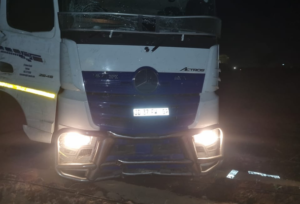
While cross border truck drivers are pissed off by TUTWA’s claims that ‘driver behaviour’ was the biggest contributor to border delays, Mike Fitzmaurice, executive director at FESARTA (Federation of Regional Road Freight Associations) has moved in to concur with the drivers.
In their response to the article many drivers questioned how the researchers identified their audience to come out with a shallow outcome as they got.
“Many drivers are paid a small basic plus per load or on commission basis hence it defies logic that one would delay themselves. If the wheel is not turning, I’m not making money,” wrote one Mr Mhungu, a Durban based cross border driver.
In his response to the article Fitzmaurice wrote:
I do not for one-minute support the claim that drivers are the main force behind border delays – the claim is not factual.
I have always maintained that at certain border posts like Beitbridge, Chirundu and a few others where drivers either have extended family or have long waiting periods at these border posts, they contribute to border delays by participating in recreational or social activities outside of the border post in the border towns and surrounds. I have even gone so far as to build this factor into my cross-border monitoring programme, but when you compare driver idle time to the overall time spent at the border it is a small percentage.
The article in FTW Online is based on a questionnaire-type survey where they solicit responses from drivers and border post stakeholders interviewed at the border posts. I am not disputing that there may be a few drivers that take advantage of the delays at the border and leave their trucks in a truck park and take time off to visit their families, but this is because of the delays at the border post. A recent study conducted by Transport Logistics Consultants (TLC) at Beitbridge identified 48 hours’ median time and 76 hours’ average time spent by truckers in truck parks waiting for Customs clearances – and this was not as a result of driver idle time, but due to clearance delays on the Zimbabwe side. Then to make the claim that “previous studies did not consider or take driver behaviour into account” is totally untrue as TLC has being doing this since 2004 when it did its first cross-border survey at Beitbridge for Fesarta (Federation of Eastern and Southern Road Transport Associations) under the tenure of the late Barney Curtis.
To me this was a poorly conducted study by people who have little knowledge or understanding of how a border post actually operates and what the procedures should be in comparison to what they actually are.
Some of the statements don’t ring true – “low levels of staffing among customs officials contributed to border post delays”. Zimra at Beitbridge has a more than adequate staff complement for the volume of work, yet they are claiming they are understaffed as per our stakeholder interviews conducted in June this year. Beitbridge handles around 900 trucks in both directions per day and they have three eight-hour equally staffed shifts with one shift on rotation and off-duty. But they handle 90% of the traffic between 08:00 and 22:00 so it would make absolute sense to load the two day shifts (06:00-14:00 and 14:00-22:00) that handle 90% of the traffic with additional staff and reduce the night shift to at least half if not less to handle the 10% of night traffic.
In comparison Busia in East Africa, which handles a similar amount of traffic per day, only has 25% of Beitbridge’s staff compliment in total with three eight-hour equally staffed shifts and one rotational shift off duty. This is possible because they have converted to an OSBP (one-stop border post), implemented efficient ICT systems and put good risk management policies in place. In addition, they have moved tariff assessments, duty payments and the issue of release orders away from the border to a central data processing centre which operates 24/7.
In my opinion this was a poorly conducted questionnaire-type survey with the wrong questions asked and no data to substantiate their claims. I would be very sceptical of the outcomes of this survey report when it is released and be very worried if it is going to be used to influence the decision-makers of the likes of the revenue authorities and other border post stakeholders.





